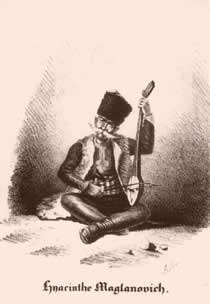La Guzla
- Not to be confused with La guzla de l'émir, a comic opera by Théodore Dubois

Maglanovic, an alleged narrator of La Guzla; book frontispiece
La Guzla, ou Choix de poesies illyriques, recueillies dans la Dalmatie, la Bosnie, La Croatie et l'Hertzegowine (The Guzla, or a Selection of Illyric Poems Collected in Dalmatia, Bosnia, Croatia and Herzegovina) was an 1827 literary hoax of Prosper Mérimée.[1]
It was presented as a collection of translations of folk ballads narrated by a guzlar (gusle player) Hyacinthe Maglanović, complete with invented commentaries. Of 29 ballads, one of them, Triste ballade de la noble épouse d'Assan-Aga, was an authentic one.
The Russian poet Alexander Pushkin translated 11 ballads from La Guzla into his cycle Songs of the Western Slavs.[2]
References
- ↑ "Literary Encyclopedia | La Guzla, ou Choix de poésies illyriques, recueillies dans la Dalmatie, la Bosnie, La Croatie et l'Hertzégowine". litencyc.com. Retrieved 2014-10-14.
- ↑ Sylvester, R.D. (2003). Tchaikovsky's Complete Songs: A Companion with Texts and Translations. Indiana University Press. p. 216. ISBN 9780253216762. Retrieved 2014-10-14.
| Wikisource has original text related to this article: |
External links
- La Guzla, in: Mérimée, Prosper (1842), Chronique du règne de Charles IX, Charpentier
- Jovanović, Vojislav Mate (1911), "La Guzla" by Prosper Mérimée (Project Gutenberg)
This article is issued from
Wikipedia.
The text is licensed under Creative Commons - Attribution - Sharealike.
Additional terms may apply for the media files.